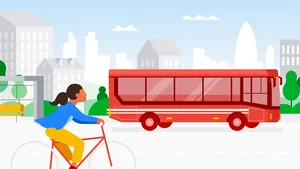Helping to solve for sustainability in Asia Pacific
As a tech-forward region that’s home to a large percentage of global youth, there’s good reason to believe that the innovation that’s needed to engage in climate action — at scale and on time — will come from Asia Pacific. We’re already seeing that people across the region are becoming increasingly concerned, with searches for sustainability-related topics reaching record highs this year in countries like India, Australia and Singapore. And, decisively, people are looking for ways to learn and take action with top-searched queries like “how to be more sustainable” and “how to recycle”.
We see an opportunity for Google to support this drive to move from ambition to action in three key areas:
Addressing our own impact
Since Google was founded in 1998, we have built sustainability into everything we do. We’ve set ambitious global goals to minimize our own carbon footprint and maximize our contribution to global climate solutions.
Across Asia Pacific, the way we tackle our carbon, water, waste and ecological impact is tailored to each country. In every community we operate in, we want to support the ecosystems that are already in place. For example, in India, we partner with local NGOs to fund and restore wells and lakes, and improve access to water and sanitation.
Expanding clean energy is also critical for us to decarbonize operations, supply chains and reach net-zero emissions — and we think we can make an impact here that can expand access to clean energy at large. For example, last week we became a founding member of the Asia Clean Energy Coalition, a multi-stakeholder initiative to accelerate clean energy in Asia by improving policy and market environments in these markets. We’re also pleased to be supporting the Clean Energy Buyers Association (CEBA) and the Clean Energy Demand Initiative (CEDI) to expand their international efforts through a $1 million grant from Google.org.
The Gopinager Well in Hyderabad, a water source for the local community, was starting to deteriorate. Google partnered with a local NGO to restore the well to better conditions.
The Gopinager Well in the process of being rebuilt and fortified.
The Gopinager Well after the restoration process.
The new and improved Gopinager well was immediately put to use, and has been helping locals source their water since its completion.
Making sustainable choices easier for everyone
As Search trends show, people across Asia Pacific are looking for more ways to practice sustainability, and we continue to build products and features that can help people make more sustainable choices in their day-to-day lives.
For example, the new Air Quality feature in Google Search and Maps uses AI to show the air quality conditions for the day, whether it’s unusually smoggy or dangerously smoky. Working with credible data provided by the National Environment Agency, we launched this feature last week in Singapore. This data can help people think about whether to stay outdoors or indoors, bringing more attention to the issue.
A combination of AI, trusted data from sources like transit authorities, and community feedback from Maps users also enables us to offer sustainable transport options. Using this information, we help people understand the schedule, crowdedness and details like accessible entrances and exits — all of which helps make taking public transport an easier choice. Cycling directions — which have rolled out Singapore, and in cities in Australia, New Zealand, Taiwan, and Japan — provide even greener options.
Supporting others to reach their goals
Our technology that’s available to our partners is where we think we can make the biggest difference, whether it’s working with cities, governments, companies or nonprofits. In fact, our Google.org grantees report that the use of AI has enabled them to achieve their goals in one third of the time, at nearly half the cost.
Partners like World Resources Institute in India are using Google Earth Engine to generate maps and the kind of analysis needed to plan targeted interventions. And the Environmental Insights Explorer, available in 17,000 cities throughout Asia Pacific, enables governments to measure carbon emissions sources and identify the right strategies to implement cleaner energy resources.
Customers using Google Cloud not only have zero net operational emissions, they’re able to use our tools to decarbonize their digital applications and infrastructure, while driving sustainable business transformation. Thai food ecommerce platform Yim Platform, for example, uses Google Cloud’s Carbon Sense suite to measure, track and disclose carbon emissions. Their goal is to further reduce this footprint, and become a fully sustainable retailer. And Aruna Fisheries is using Google Cloud to promote sustainable fishing by matching supply with demand based on data insights.
Ideas can come from anywhere — so supporting non-profits and startups is critical, too.
We’ve seen that change can start with local, tech-driven solutions that can then be scaled to other areas. To date, Google.org has given more than $14 million in funding to nonprofits focused on sustainability and climate-related issues in Asia Pacific. In Indonesia, Google.org is supporting Edu Farmers International Foundation, an organization that educates farmers and scales machine learning technology to maximize production yields. Google.org is also providing a grant to World Food Program USA to support the work of the United Nations World Food Programme (WFP) in Indonesia, which enables governments and communities to better forecast and respond to extreme weather events— helping achieve better food security.
If you’re a nonprofit organization working to combat climate change or drive sustainability, we encourage you to apply for funding through the AVPN APAC Sustainability Seed Fund, supported by Google.org and the Asian Development Bank. The fund aims to support non-profits using emerging technologies to solve local climate challenges across Asia Pacific. And for-profit startups can also access support through the Google for Startups Accelerator: Circular Economy, which is open to organizations innovating toward a waste-free world.
As we look beyond COP27 and into the future, we’re hopeful. Our work has taught us that there is strength in collaboration, and that the power of technology, especially AI, can help solve a number of the challenges we face. Partnerships like these – between businesses, communities, policymakers and individuals – demonstrate that we can go further when we work together to solve for sustainability.







